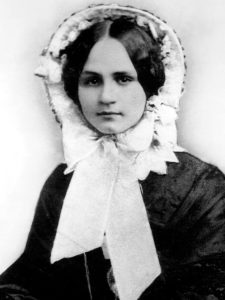
Callie Collins is that rare species of writer who exudes sheer enjoyment in her work. As she sits on the sunny porch of the Canteen in Provincetown, describing the projects she is currently working on as a fellow at the Fine Arts Work Center and cupping a bowl of clam chowder — her favorite Cape Cod culinary discovery — she displays a refreshing absence of creative angst and self-doubt, and her enthusiasm for her characters is infectious.
“If I stopped finding joy in writing, I wouldn’t do it anymore,” she says. “I really don’t feel driven to write, regardless of suffering. I feel as if it’s something that I like to do, and it’s working for me right now.”
During her time at FAWC, Collins has completed a collection of short stories and started researching her first novel. The story collection, from which Collins will give a reading next Thursday, Feb. 6, was born during her three years at the University of Michigan’s Helen Zell Writers’ Program. She was formerly a flash fiction writer who founded a small press in her hometown of Austin, Texas, but now Collins has discovered that she’s drawn to writing longer and longer works, especially those that are historical.
“I love to research,” Collins says, “and there are great stories and characters in Texas history — great and terrible stories. I’m a fifth- or sixth-generation Texan, and my ancestors are all from very rural areas. Texas has this identity, this self-perpetuating mythology of having been its own country and having had its own presence. I’m interested in that kind of place-based history or legend and the ways in which it comforts people and also hurts people. And how, particularly in times of crisis or turbulence, you turn to your idea of a place rather than what is actually happening around you.”
The people at the center of Collins’s stories are usually women or queer — characters who were often peripheral in the dominant historical narrative. The subject of the longest story in the collection, a 90-page novella, is the third and final wife of Sam Houston, a major figure in Texan independence in the 1830s.

“Margaret was 20 when she married a very famous man, who was by all accounts not a catch,” Collins says. For example, Houston reportedly had a wound in his groin that oozed, which may have caused his first wife to leave him. Hearing this story, Collins wanted to figure out what drove young Margaret to marry Houston.
“Often women are in positions where they’re one circle out of fame,” she says. “I was interested in a different sort of portrayal of that kind of a woman.”
In choosing subjects, Collins seeks what she calls “the perfect balance between information and the lack of it,” so she can creatively fill in the gaps. Margaret Houston was an ideal subject. “I had exactly the amount of factual details about her real life that I needed and very little holding me back from writing exactly the kind of woman I thought she might be,” Collins says. “No one at that time of recording was interested in the internality of women.”
Imagination aside, she wants her fiction to have an authentic voice. “I’m not a person who writes every day, because if I did, I would finish a story in a particular voice and wake up the next morning and start writing the next one in the same voice,” Collins says. She favors writing either in close third or first person, and she likes “to give each story a lot of breathing room, so that I can get into that person’s voice as deeply as I possibly can.”
Given her focus on voice, it’s not surprising that Collins’s first novel-in-progress centers on music. “My family’s mythology is the Austin music scene,” she says. “My dad was a drummer in Austin in the ’60s and ’70s and is still very involved in that scene. He likes to tell the story of Janis Joplin coming to one of his parties.” She laughs. An important character in Collins’s novel is the late Texas musician Doug Sahm, who played at her parents’ wedding in 1983.
“I grew up with his legend, so it’s fun research to do,” she says. “Austin was a crazy place in the ’70s. It was moving from a backwater Texas town into something of a national creative presence. I’m interested in that moment of change.”
The novel mainly takes place in a bar, where Sahm is the leader of the house band, the Texas Tornados. “I love writing about bars,” Collins says. “I think alcohol is one of the most complicated kind of ways people deal with their lives. Bars become places of both deep struggle — life-threatening struggle for some people — and pure fun on the other end. I’m in the pure research part right now,” she says with a smile. “So, I’m in a good mood.”
Lone Star-struck
The event: Reading by fiction fellow Callie Collins (and poetry fellow Esther Lin)
The time: Thursday, Feb. 6, at 6 p.m.
The place: Fine Arts Work Center, 24 Pearl St., Provincetown
The cost: Free



